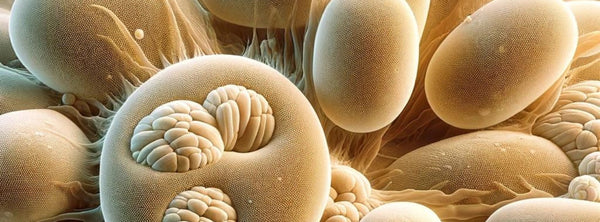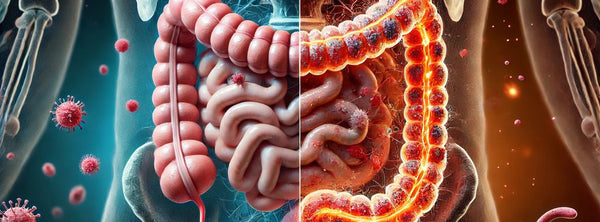
-
Antioxidants Our Forgotten Friend
In our modern world, our bodies constantly contend with external forces seeking to harm and damage. While the immune system and detoxification organs offer robust defences, what safeguards our cells on a microscopic level? Here, the unsung heroes, Antioxidants, emerge—microscopic chemicals abundantly present in natural foods and produced by our bodies. Their purpose: to provide cellular protection.
By fortifying the trillions of cells composing our body, antioxidants ensure the resilience and vibrancy of our organs, structure and overall health. Imagine a valuable car or sturdy steel equipment, left exposed to the elements, succumbing gradually to the corrosive effects of rust. Over time, their once-vibrant frames fade into distant memories. A protective coat could have preserved their resilience against the relentless forces of oxidation.
Similarly, our body's cells face damage from oxidation, akin to the rusting process. This natural phenomenon, known as oxidative stress, gives rise to harmful molecules called free radicals and reactive oxygen species—corrosive agents attacking our cells and DNA, causing significant damage. The cumulative impact of oxidative damage poses a concerning prospect, leading to various health issues such as cancer, heart disease, diabetes, dementia and premature ageing.
Enter Mother Nature's solution: antioxidants. These remarkable, plant-based substances act as a shield, safeguarding our cells from the destructive effects of oxidation. They neutralise harmful free radicals, preventing further damage and ensuring our cellular landscape remains resilient. In this symbiotic relationship with antioxidants, our cells find protection, allowing us to navigate the challenges of our environment while maintaining a robust and vibrant state of health.
For More Information Please Click On The Tabs Above
-
Common Health Conditions Associated With Antioxidant Deficiencies
In the intricate tapestry of health and disease, numerous factors contribute to the onset of various ailments. Amidst this complexity, a common thread emerges, weaving its way through different health conditions—a thread known as antioxidant deficiency. As we navigate through life and try to maintain a healthy well-being, it becomes apparent that the presence or absence of antioxidants plays a crucial role in influencing our overall health. While diseases may have diverse origins, the shared vulnerability to antioxidant deficiency underscores its significance in the broader context of our long-term health. Below are a list of common, but not exclusive list of health conditions linked to Antioxidant Deficiency.
Atherosclerosis:
-
Oxidative Damage:
Oxidative stress significantly contributes to atherosclerosis. In this process, free radicals oxidise low-density lipoprotein (LDL) cholesterol, turning it into oxidised LDL. Oxidised LDL is more likely to accumulate in the arterial walls, initiating an inflammatory response. This inflammation, combined with oxidative stress, leads to the formation of atherosclerotic plaques. These plaques can narrow and stiffen the arteries, restricting blood flow and potentially leading to serious complications like heart attacks and strokes. [1]
-
Antioxidant Protection:
Antioxidants act as vigilant guards, intercepting this detrimental process. They neutralise free radicals, preventing the oxidation of LDL cholesterol. This crucial intervention reduces the formation of plaque in arteries, thereby diminishing the risk of atherosclerosis and related cardiovascular issues.
Arrhythmias:
-
Oxidative Damage:
Oxidative stress can affect the electrical signalling in the heart, contributing to arrhythmias (irregular heartbeats). Free radicals can interfere with ion channels and disrupt the normal rhythm of the heart. While multiple factors contribute to arrhythmias, oxidative stress is recognised as one of the potential triggers. [2]
-
Antioxidant Protection:
Antioxidants help protect against arrhythmias by neutralising free radicals that disrupt normal heart rhythm. While multiple factors contribute to arrhythmias, antioxidant-rich foods and a healthy lifestyle help to provide protective benefits.
Cancer:
-
Oxidative Damage:
Free radicals, highly reactive molecules generated during oxidative stress, can inflict severe damage to DNA. This oxidative damage creates a favourable environment for the development of cancer by promoting mutations in crucial genes. [3]
-
Antioxidant Protection:
Antioxidants serve as vigilant defenders against this threat. By neutralising free radicals, antioxidants prevent their destructive impact on DNA. This protective role significantly reduces the risk of genetic mutations, acting as a formidable barrier against the initiation and progression of cancer.
Diabetes Type 2:
-
Oxidative Damage:
Oxidative stress plays a central role in the development of diabetes by fostering insulin resistance and impairing pancreatic function. Free radicals disrupt cellular signalling pathways, contributing to these metabolic disturbances that lead to diabetes. [4]
-
Antioxidant Protection:
Antioxidants emerge as defenders against this metabolic turmoil. By neutralising free radicals, antioxidants enhance insulin sensitivity, facilitating proper glucose regulation. Additionally, antioxidants may protect pancreatic beta cells from oxidative damage, contributing to the prevention or management of diabetes.
Female Infertility:
-
Oxidative Damage:
Oxidative stress can impact female fertility in several ways. It may contribute to the ageing of eggs (oocytes) and ovarian decline, affecting both the quantity and quality of eggs. Additionally, oxidative stress can harm the delicate environment of the reproductive organs, affecting the endometrium and impairing implantation of the fertilised egg.[5]
-
Protecting Oocytes:
Antioxidants help protect oocytes from oxidative damage, preserving their integrity and potentially improving the chances of successful fertilisation. This protection is particularly relevant for women undergoing assisted reproductive technologies (ART) like in vitro fertilisation (IVF).
-
Improving Endometrial Health:
Antioxidants contribute to maintaining a healthy uterine environment by reducing oxidative stress in the endometrium. This can enhance the chances of successful implantation and a healthy pregnancy.
-
Addressing Polycystic Ovary Syndrome (PCOS):
PCOS, a common cause of female infertility, is associated with oxidative stress. Antioxidants are beneficial in managing PCOS-related fertility issues by reducing oxidative damage and supporting hormonal balance.
-
Menstrual Cycle Regularity:
Antioxidants have a positive impact on the regularity of menstrual cycles, which is crucial for optimising fertility. Balanced hormonal levels and a healthy menstrual cycle are vital factors in female reproductive health.
Heart Failure:
-
Oxidative Damage:
Chronic oxidative stress is associated with heart failure. The heart's muscle cells can experience oxidative damage, leading to impaired contractility and function. Additionally, oxidative stress can contribute to inflammation, fibrosis and structural changes in the heart, all of which can contribute to heart failure. [6]
-
Antioxidant Protection:
Antioxidants protect the heart muscle cells from oxidative damage, preserving their contractility and function. Additionally, antioxidants help mitigate inflammation and fibrosis in the heart, supporting overall cardiac health. A balanced intake of antioxidants is essential for maintaining a healthy heart and reducing the risk of heart failure.
Hypertension (High Blood Pressure):
-
Oxidative Damage:
Oxidative stress is implicated in the development and progression of hypertension. Reactive oxygen species generated during oxidative stress can impair the function of blood vessels, leading to endothelial dysfunction. This dysfunction contributes to increased vascular resistance, elevating blood pressure. Over time, persistent hypertension can strain the heart and arteries, increasing the risk of heart disease. [7]
-
Antioxidant Protection:
Antioxidants support vascular health by neutralising reactive oxygen species that contribute to endothelial dysfunction. This protective action helps maintain the flexibility and function of blood vessels, contributing to the prevention or management of hypertension. A diet rich in antioxidants is beneficial for supporting cardiovascular health.
Immune System Dysfunction:
-
Oxidative Damage:
Oxidative stress impairs immune function by negatively impacting immune cells. Free radicals are disruptive agents that contribute to this dysfunction, compromising the body's ability to mount effective defences against infections and diseases.
-
Antioxidant Protection:
Antioxidants are great immune friends and act as champions of immune health. By neutralising free radicals, antioxidants preserve the integrity and functionality of immune cells. This protective action supports a robust immune system, ensuring an effective defence against pathogens and maintaining overall health.
Inflammation:
-
Oxidative Damage:
Oxidative stress acts as a catalyst for inflammation, activating pathways that contribute to chronic inflammatory conditions such as arthritis, heart disease or dementia. Free radicals play a crucial role in initiating and sustaining this inflammatory response. [7]. [8]
-
Antioxidant Protection:
Antioxidants act as peacekeepers in the inflammatory battlefield. By neutralising free radicals, antioxidants quell the inflammatory response, providing relief from symptoms associated with chronic inflammatory conditions.
Kidney Diseases:
-
Oxidative Damage:
Oxidative stress is associated with kidney diseases, including chronic kidney disease (CKD). Prolonged inflammation and structural damage in CKD are influenced by oxidative stress, contributing to cellular dysfunction. [9]
-
Antioxidant Protection:
Antioxidants emerge as guardians of kidney health. By neutralising free radicals, antioxidants help protect the kidneys from oxidative damage, reduce inflammation and preserve overall kidney function. This protective role is essential in mitigating the progression of kidney diseases.
Liver Diseases (e.g., Nonalcoholic Fatty Liver Disease - NAFLD):
-
Oxidative Damage:
Oxidative stress is implicated in liver diseases, including NAFLD, where excess fat accumulates in the liver cells, leading to inflammation and potential liver damage. Oxidative stress worsens this condition by promoting inflammation and cell damage. [10]
-
Antioxidant Protection:
Antioxidants assume a vital role in maintaining liver health. Through their capacity to neutralise free radicals, antioxidants act as guardians, thwarting oxidative damage and providing a shield against the advancement of liver diseases. This protective function not only bolsters overall liver function but also mitigates the risk of complications linked to various liver conditions. Additionally, antioxidants contribute to the intricate process of detoxification, aiding in the reduction of toxins, which reduces oxidative stress, further fortifying the liver's resilience and promoting overall well-being.
Male Infertility:
-
Oxidative Damage:
The intricate machinery of sperm, crucial for motility and fertilisation capability, becomes particularly vulnerable under the assault of oxidative stress. The assault on sperm by free radicals can lead to structural and functional impairments, compromising their ability to navigate the reproductive journey successfully. Understanding and addressing the impact of oxidative stress on sperm function becomes paramount in the pursuit of strategies to enhance male fertility and promote reproductive health. [11]
-
Antioxidant Protection:
Antioxidants, have the potential to improve sperm quality. By neutralising free radicals, antioxidants help protect sperm cells from oxidative damage, enhance their function and potentially improve fertility outcomes. This protective role is crucial in addressing the impact of oxidative stress on male reproductive health.
Multiple Sclerosis (MS):
-
Oxidative Damage:
Oxidative stress leads to an increase in reactive oxygen species that contribute to the damage of the central nervous system, including the myelin sheath surrounding nerve fibres. This damage leads to neurodegeneration and the progression of Multiple Sclerosis. [12]
-
Antioxidant Protection:
Antioxidants have a neuroprotective role in Multiple Sclerosis by neutralising free radicals and reducing oxidative stress. This makes antioxidants important helpers in managing and preventing MS
Neurodegenerative Diseases (e.g., Alzheimer's, Parkinson's):
-
Oxidative Damage:
Free radicals induce oxidative damage to the neurons in the brain, a process intricately linked to the progression of neurodegenerative diseases. This damage accelerates the degeneration of critical brain structures, leading to conditions like Alzheimer's and Parkinson's. [13]
-
Antioxidant Protection:
Antioxidants, particularly those capable of traversing the blood-brain barrier, function as guardians for the brain's well-being. Anthocyanin's, a specific antioxidant present in berries, successfully navigate into the brain, acting as defenders against oxidative damage to its intricate structures and nerves. By neutralising free radicals, these anthocyanin's play a crucial role in preserving both the structural and functional integrity of neurons. This protective mechanism serves to decelerate the degenerative processes linked to neurodegenerative diseases, contributing to the overall health and resilience of the brain.
Premature Ageing:
-
Oxidative Damage:
Cumulative oxidative damage to cells, tissues and DNA is a hallmark of the ageing process. Free radicals, as agents of this damage, contribute to the accelerated ageing of cellular structures, leading to not only the visible signs such as wrinkles, but the accelerated decline of any part of the body. [14]
-
Antioxidant Protection:
Antioxidants stand as guardians against premature ageing. By neutralising free radicals, antioxidants minimise oxidative stress, preserving the vitality and elasticity of skin. This protective action contributes to a more youthful appearance and supports overall longevity.
Respiratory Conditions (e.g., Asthma):
-
Oxidative Damage:
In the respiratory system, exposure to environmental pollutants, allergens and infections can trigger oxidative stress. Free radicals generated during oxidative stress contribute to inflammation and damage airway tissues, exacerbating conditions like asthma. [15]
-
Antioxidant Protection:
Antioxidants act as defenders against respiratory assaults. By neutralising free radicals, antioxidants mitigate inflammation and preserve the normal function of the respiratory system. This protective role aids in reducing the severity of asthma symptoms and maintaining overall respiratory health.
Rheumatoid Arthritis:
-
Oxidative Damage:
Oxidative stress is a contributor to the development and progression of rheumatoid arthritis. The immune system's misguided attack on joints leads to inflammation and oxidative damage to joint tissues, exacerbating the condition. [16]
-
Antioxidant Protection:
Antioxidants play a role in managing Rheumatoid Arthritis by neutralising free radicals. By reducing inflammation and mitigating oxidative damage, antioxidants potentially slow down joint damage. This protective action contributes to maintaining joint health and managing symptoms associated with rheumatoid arthritis.
Systemic Lupus Erythematosus (SLE):
-
Oxidative Stress's Role:
Oxidative stress is implicated in the pathogenesis of SLE. Free radicals can contribute to the activation of immune cells, the formation of autoantibodies and damage to various tissues, including the skin, joint and kidneys. [17]
-
Antioxidant Protection:
Antioxidants may help in managing SLE by reducing oxidative stress and its detrimental effects. They may contribute to controlling inflammation and preserving organ function in individuals with lupus.
Type 1 Diabetes:
-
Oxidative Damage:
The intricate relationship between oxidative stress and the onset of type 1 diabetes underscores the multifaceted nature of this complex autoimmune condition. Free radicals play a pivotal role by contributing to the destruction of insulin-producing beta cells situated in the pancreas. [18]
-
Antioxidant Protection:
Antioxidants have a protective role in preserving beta cell function and reducing the risk of type 1 diabetes. Some studies suggest that antioxidant-rich diets may be associated with a lower risk of developing this autoimmune condition.
Vision Problems (e.g., Age-Related Macular Degeneration):
-
Oxidative Damage:
Oxidative stress is a significant contributor to vision problems such as age-related macular degeneration. Free radicals pose a threat by causing oxidative damage to the delicate structures of the eyes leading to a variety of vision related problems. [19]
-
Antioxidant Protection:
Protecting ocular health, antioxidants such as lutein and zeaxanthin in green leafy vegetables and red/orange foods, act as guardians for the eyes. The anthocyanin's abundant in berries also contribute to this protective role, forming a collective shield against potential threats to eye health. Concentrated in the macula, these antioxidants neutralise free radicals, preventing oxidative damage and preserving visual function. This protective action contributes to maintaining clear vision and reducing the risk of age-related vision issues.
For More Information Please Click On The Tabs Above
-
-
What Can Lead To Low Antioxidant Levels?
Antioxidant deficiencies can arise from a multitude of factors that disrupt the delicate equilibrium between free radicals and the protective antioxidants in the body. Understanding these causes sheds light on the importance of maintaining a robust antioxidant defence system. Here are some common contributors to antioxidant deficiencies:
Age-Related Changes and Nutrient Absorption:
As individuals age, the absorption of crucial nutrients may be impacted. Factors such as a reduction in stomach acid, insufficient digestive enzymes, or intestinal inflammation can potentially result in deficiencies of antioxidants and other essential compounds. Addressing these age-related changes becomes essential to ensure adequate nutrient intake and maintain overall health.
Chronic Inflammation and Antioxidant Demand:
Conditions characterised by chronic inflammation, including autoimmune diseases, joint disorders, or persistent infections, elevate oxidative stress levels within the body. This heightened oxidative stress necessitates an increased demand for antioxidants to counteract the damaging effects and support the body's natural defence mechanisms. Understanding and addressing this link between chronic inflammation and antioxidant requirements becomes crucial in managing health outcomes.
Chronic Stress and Free Radicals:
Prolonged periods of stress trigger the release of free radicals in the body, contributing to oxidative stress. The demands placed on the body during such times require a higher intake of antioxidants to restore balance and mitigate the potential harmful effects of free radicals.
Environmental Toxins and Oxidative Stress:
Exposure to environmental pollutants, toxins and stressors, such as air pollution, chemicals, or cigarette smoke, can significantly increase oxidative stress levels. The body's natural defence mechanisms may become overwhelmed in the face of these external challenges, necessitating an increased supply of antioxidants to neutralise free radicals and protect against oxidative damage. Being mindful of environmental exposures and adopting antioxidant-rich strategies becomes imperative in promoting resilience against the impact of external toxins.
Digestive Disorders:
Conditions like leaky gut syndrome, celiac disease, Crohn's disease, or other gastrointestinal disorders can impair nutrient absorption, hindering the uptake of antioxidants.
Inadequate Detoxification:
The intricate relationship between poor detoxification and reduced antioxidants manifests through overwhelmed detox pathways, leading to the accumulation of toxins in the body. As these toxins accumulate, they contribute to oxidative stress by generating an excess of free radicals, depleting the available antioxidants crucial for neutralising them. The depletion of potent antioxidants like glutathione further exacerbates this imbalance, impairing cellular function and perpetuating a cycle of oxidative damage. This systemic impact extends across organs and systems, heightening vulnerability to inflammation and chronic diseases. Moreover, poor detoxification may deplete essential nutrients, hindering the body's ability to produce and replenish antioxidants.
Low Consumption of Nutrient-Rich Foods:
A diet lacking in fruits, vegetables, nuts and seeds, which are rich sources of antioxidants, can lead to insufficient intake, compromising the body's antioxidant reservoir.
Medical Conditions:
Chronic diseases like diabetes, cardiovascular disorders and neurodegenerative conditions heighten the demand for antioxidants as the body combats increased oxidative stress.
Medications:
-
Antibiotics:
Certain antibiotics, notably Tetracyclines and Fluoroquinolones, can amplify oxidative stress in the body, depleting antioxidant levels as the body combats the surge of free radicals resulting from these drugs. To counteract this, boosting antioxidant consumption through diet or supplements is advised to maintain cellular protection.
-
Chemotherapy:
Specifically with drugs like Doxorubicin, Cisplatin and Carboplatin, target cancer cells but also promote free radical production, heightening oxidative stress. This increase can harm healthy cells, underscoring the importance of antioxidants for those undergoing such treatments.
-
Antipsychotics:
Antipsychotic drugs, such as Haloperidol, Clozapine and Olanzapine, prescribed for conditions like schizophrenia and bipolar disorder, are linked to oxidative stress, potentially affecting brain health and leading to neurological issues. Adequate antioxidant intake is crucial in alleviating the oxidative impact of long-term antipsychotic medication use.
-
Non-steroidal Anti-Inflammatory Drugs (NSAIDs):
Extended use of NSAIDs, including Ibuprofen, Naproxen and Aspirin, for their pain-relieving and anti-inflammatory effects, is associated with increased oxidative stress. This not only challenges the body's antioxidant capacity but may also harm gastrointestinal health, contributing to conditions like Leaky Gut Syndrome. This gut damage further elevates oxidative stress, suggesting the need for antioxidant-rich nutritional support and careful NSAID management to ensure holistic health maintenance.
Unhealthy Lifestyle Choices:
-
Smoking:
The act of smoking introduces an abundance of free radicals into the body, significantly increasing oxidative stress and depleting antioxidant defences. This surge in harmful compounds can escalate the risk of developing serious health conditions such as heart disease, respiratory issues and cancer.
-
Excessive Alcohol Consumption:
Regular intake of alcohol puts a strain on the body's antioxidants, particularly affecting the liver — an organ pivotal for detoxification processes. The oxidative stress induced by alcohol can lead to liver inflammation and damage, underlining the importance of moderate consumption and a diet abundant in antioxidants to safeguard liver function and uphold antioxidant levels against alcohol-induced oxidative harm.
-
Stimulants:
Consuming stimulants like cocaine and methamphetamine escalates free radical production, leading to increased oxidative stress. This condition can hasten the ageing process and heighten the risk for neurological and cardiovascular conditions by damaging bodily tissues.
-
Inhalants:
Exposure to certain inhalants — ranging from industrial chemicals and household cleaners to aerosols and vaping products — poses a risk by inducing oxidative stress and harming lung tissue. Inhalants and vaping materials release chemicals and particles capable of generating free radicals, similarly to tobacco smoke, which can deteriorate lung function and foster respiratory diseases.
-
Sedentary Lifestyle:
Leading a sedentary life can weaken the body's antioxidant defence mechanisms, reducing its capacity to neutralise free radicals effectively. Engaging in regular physical activity not only elevates antioxidant levels but also enhances the body's resilience to oxidative stress, promoting a healthier lifestyle and minimising the risk of chronic health issues. Incorporating exercise into your daily routine is a key step in boosting your body's antioxidant defences and ensuring robust health.
For More Information Please Click On The Tabs Above
-
-
How To Increase Antioxidant Levels
Elevating antioxidant levels in the body entails embracing a balanced and diverse diet that incorporates a wide array of nutrient-rich foods. In some instances, especially during serious illnesses or due to an insufficiently nourishing lifestyle, supplementation may become necessary. Here are various strategies to enhance your antioxidant intake and promote overall health:
Daily Diet:
Incorporate a diverse array of colourful fruits, berries and vegetables into your diet, as vibrant hues often signify a rich content of antioxidants. Berries, in particular, boast a purple pigment known as anthocyanin's, a potent antioxidant with the ability to cross the blood-brain barrier, offering protective effects for the brain and neurotransmitters. Beyond its cognitive benefits, anthocyanin's contribute to heart health, possess anti-inflammatory properties, aid in blood sugar regulation, safeguard eye health, influence weight management and promote skin well-being. Strive for a plate resembling a rainbow, as this not only creates an appealing visual, but also ensures a broader intake of antioxidants, fostering overall health and vitality.
Include Nuts and Seeds:
Almonds, walnuts, chia seeds, flaxseeds and sunflower seeds are rich in antioxidants, healthy fats and other essential nutrients.
Choose Whole Grains and Legumes:
Opt for whole grains such as brown rice, quinoa, oats, whole wheat, beans, lentils and chickpeas which provide antioxidants along with fibre and other nutrients.
Embrace Healthy Fats:
Avocado, olive oil and fatty fish like salmon are sources of antioxidants and heart-healthy fats.
Enjoy Herbs and Spices plus Hydrate with Herbal Teas:
Turmeric, ginger, chamomile, green tea, cinnamon and oregano are examples of herbs and spices with antioxidant properties.
Eat Dark Chocolate:
The dietary advice everyone loves. Dark chocolate contains flavonoids with antioxidant properties. Choose chocolate with at least 70% cocoa content and consume it in moderation.
Limit Processed Foods:
Reduce the intake of processed and highly refined foods, which may have lower antioxidant content and are major dietary contributors of oxidative stress.
Cook with Healthy Methods:
Choose cooking methods like steaming, roasting, or grilling to preserve the antioxidant content in your food.
Consider Supplements:
If meeting your antioxidant needs through food alone is challenging, you may want to explore antioxidant supplements. One such option is NatroVital Antioxidant Support, which is rich in anthocyanin's and sourced from 12 red and purple berries and fruits. Additionally, NatroVital Green Cleanse contains chlorophyll known for its ability to neutralise free radicals and exhibit a strong anti-inflammatory effect. These supplements can be a convenient way to support your antioxidant intake and overall health.
We hope you found this blog '20 Health Issues Tied to Antioxidant Deficiency' useful and if you did, please share on social media.
Thanks and have a great day.
The information provided in this blog '20 Health Issues Tied to Antioxidant Deficiency' is general and intended for educational purposes only. We make no claims to diagnose, treat, prevent, alleviate or cure illnesses or diseases with any information or product stated. With any health issue, we suggest you Consult your healthcare professional before undertaking any health treatment.



